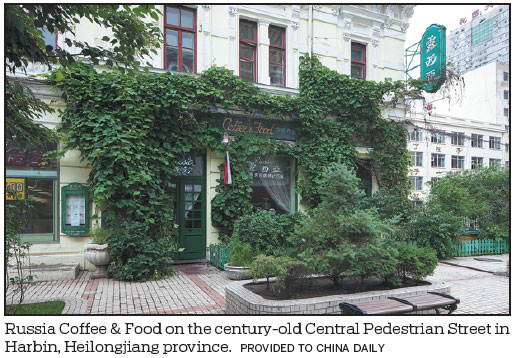Russian restaurant owner driven by passion


Architect set up venue in Harbin 19 years ago and is carving out a career in writing.
Strolling down the century-old Central Pedestrian Street in Harbin, tourists cannot miss the Russian restaurant or the remarkable story of its owner.
For Hu Hong and his 19-year-old Russia Coffee & Food, busy season comes every winter as the "ice city" in China's northernmost Heilongjiang province sees more visitors.
Food lovers come and go, rarely realizing that the Russian meat pies, accordion music and art at the restaurant all come from Hu.
Tens of thousands of Russians came to Harbin at the turn of the 20th century when construction of the Chinese Eastern Railway was underway. Missing a taste of their homeland, many opened Russian restaurants.
Born to a Russian mother in a Chinese-Russian marriage, Hu, 68, grew up immersed in Russian cuisine, music and architecture. He still remembers the taste of the Russian food his mother and grandmother cooked for him when he was a child.
A carpenter in his teens, Hu came to the fore with a talent for architecture after he finished middle school and built farmhouses with his peers in Heilongjiang's Baoqing county in 1968.
In 1988, Hu left Harbin for Japan, working as an architect. He set up his own architecture and design firm in Tokyo, with his designs appearing in Kobe, Nagasaki, Yokohama and Fukuoka.
He returned 12 years later and opened the restaurant on the 1,400-meter-long street. The reason was not only to beat his homesickness but to restore Russian culture and lifestyle to the city.
"I did the interior design myself, from tables and chairs to wood carvings on the ceiling," Hu said. "Construction work took four years based on more than 2,000 design drawings."
In addition to the oil paintings, photos, furniture and other decorations, he set the menu, with every recipe carefully considered.
In 2007, Russia Coffee & Food was rated as one of the 50 best restaurants in China by National Geographic magazine, Hu said.
Hu loves writing about the city and has finished several novels. He published his first book in 2016 and is now working on a new novel that depicts the lives of early Russian settlers in Harbin.
"I visited Russia several times in recent years, mainly in search of inspiration for my story," he said.
His friends are always curious about his job labels: chef, musician, writer and architect. Which one does he value most?
"They are all me," Hu replied.
When the restaurant is not busy, he usually reads books in the morning and spends an hour playing the accordion. Hu spends three to four hours writing every day, sometimes until after midnight. He also helps children to learn Western dining etiquette on weekends.
In recent years, a growing number of people like Hu have multiple professional and diversified lifestyles.
"I'll keep on my endeavor to build beautiful architecture, make authentic Russian food and write real stories about Harbin," he said.




































